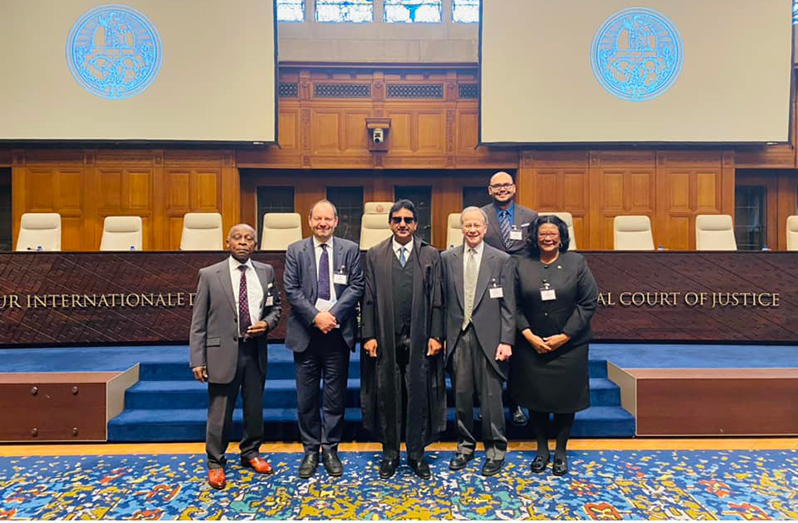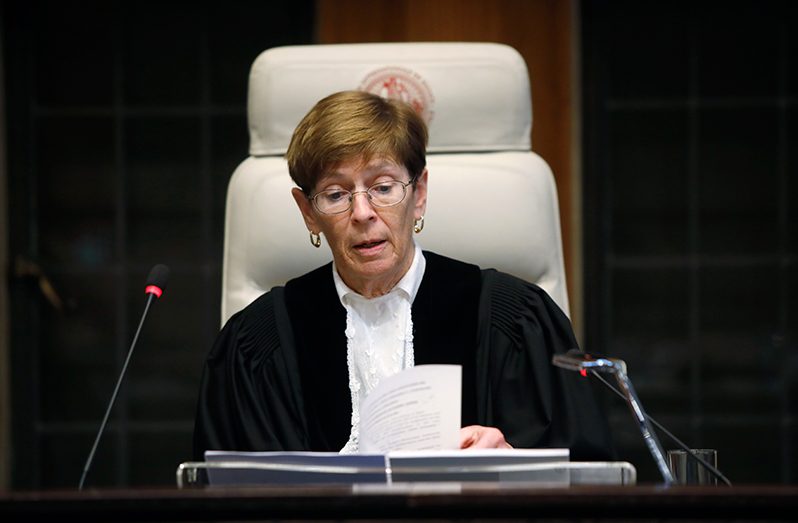-ICJ throws out Venezuela’s preliminary objection in border case
GUYANA, on Thursday, moved one step closer to having the longstanding border controversy resolved when the International Court of Justice (ICJ) unanimously dismissed the preliminary objection raised by Venezuela in the case which concerns the Arbitral Award of October 3, 1899.
The ruling was handed down by Judge Joan E. Donoghue at the Peace Palace in The Hague, Netherlands. Of the 15-member panel of judges, only one voted in favour of Venezuela.
Guyana moved to the ICJ with its case in March 2018, challenging the non-participating Bolivarian Republic of Venezuela over its disagreement on the legal validity and binding effect of the 1899 Award.
Venezuela maintained that the ICJ was without jurisdiction to hear the case and refused to participate in the court proceedings.
In recapping the facts of the case on Thursday, Justice Donoghue said that in a December 18, 2020, 12-4 majority ruling, the court had upheld that it has jurisdiction to entertain Guyana’s contention concerning the validity of the award which concerns the frontier between British Guiana and Venezuela, and the related question of the definitive settlement of the land boundary.
The ICJ pointed out that both Guyana and Venezuela had agreed to the 1966 Geneva Agreement, which showed that both parties had accepted the possibility of the controversy being resolved by means of judicial settlement.
The ICJ judge said timelines were set for Guyana and Venezuela to file written pleadings on the merits of the case. Guyana met its March 8, 2022 deadline to submit its Memorial on the merits of its case to the court. Venezuela, on the other hand, submitted preliminary objections.
As a result, the ICJ allowed for such an objection to be lodged and considered by the court, and, as a consequence, the proceedings on the merits of the case were suspended until it ruled on that objection.
The Spanish-speaking country had claimed that it is the “sole indisputable inheritor” of the Essequibo region and the Monetary Gold Principle.

Although Venezuela had claimed that the ICJ did not have jurisdiction to hear the substantive case, the country made a U-turn following the court’s December 2020 ruling on that aspect of the case. Venezuela on that occasion contended that Guyana had no standing in the matter.
Venezuela had argued that the United Kingdom was the proper party, since the territory was “given” to Guyana by the British. However, the ICJ found that Venezuela’s objection on the basis of the Monetary Gold principle is an objection to the exercise of the court’s jurisdiction and thus does not constitute an objection to jurisdiction.
Based on a thorough analysis of the facts and relevant legal precedents, the ‘World Court’ also found Venezuela’s preliminary objection is admissible on this ground.
The court found that in view of the above, the practice of the parties to the Geneva Agreement further demonstrates the two countries’ agreement that the dispute could be settled without the involvement of the United Kingdom.
“In light of the foregoing, the court concludes that, by virtue of being a party to the Geneva Agreement, the United Kingdom accepted that the dispute between Guyana and Venezuela could be settled by one of the means set out in Article 33 of the Charter of the United Nations and that it would have no role in that procedure. Under these circumstances, the Court considers that the Monetary Gold principle does not come into play in this case.
“It follows that even if the court, in its judgement on the merits, were called to pronounce on certain conduct attributable to the United Kingdom, which cannot be determined at present, this would not preclude the court from exercising its jurisdiction, which is based on the application of the Geneva Agreement. The preliminary objection raised by Venezuela must therefore be rejected,” Justice Donoghue said in her ruling.
The court unanimously rejected Venezuela’s objection and will move forward with the substantive case.
Guyana seeks to obtain a final and binding judgement that the 1899 Arbitral Award which establishes the location of the land boundary between the two countries, remains valid, and that the Essequibo region belongs to Guyana, not Venezuela.
Guyana was represented by Attorney-General and Minister of Legal Affairs, Anil Nandlall, S.C.; Minister of Parliamentary Affairs and Governance, Gail Teixeira; Agent of Guyana in the case concerning the Arbitral Award of October 3, 1899, Carl Greenidge; Co-Agent and Permanent Secretary of the Ministry of Foreign Affairs and International Co-operation, Ambassador Elisabeth Harper; Director of the Frontiers Department of the Ministry of Foreign Affairs and International Co-operation, Donnette Streete; and Adviser to the Leader of the Opposition on Frontier matters, Ambassador Ronald Austin.



.jpg)










